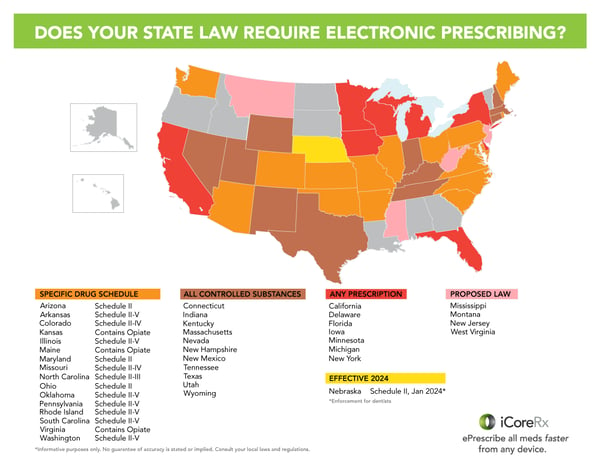Using Patient Education Videos to Support Preventive Care Strategies
As a healthcare provider, you know prevention saves lives. From routine screenings and lifestyle counseling to vaccinations and early detection,...
4 min read
Robert McDermott Jul 13, 2023 12:00:00 PM
 For over a decade, the healthcare field has been heralding the arrival of the digital age and digital revolution. When EHRs arrived and data security improved, it seemed almost certain that the days of file drawers and prescription pads were done. Yet here we are, fully entrenched in electronic records, ePrescriptions, and communications and, still, some physicians and dentists remain reliant upon pen and paper when it comes to paperwork and prescriptions.
For over a decade, the healthcare field has been heralding the arrival of the digital age and digital revolution. When EHRs arrived and data security improved, it seemed almost certain that the days of file drawers and prescription pads were done. Yet here we are, fully entrenched in electronic records, ePrescriptions, and communications and, still, some physicians and dentists remain reliant upon pen and paper when it comes to paperwork and prescriptions.
Quick Links
We all know someone who holds on to aging technology for any number of reasons. For some it is just about a slow shift to modern technology due to habit and lack of motivation to change, and for others it’s about resistance to changing workflows, perceived costs and other concerns.
When it comes to shifting from paper to digital records, many HCP’s have been forced to make the shift. And then they realized that, for patient care, being able to quickly and effectively communicate patient concerns, diagnoses, and more, EHRs have improved the field in immeasurable ways. Thankfully, the demands have forced the transitions of many physicians and dentists to electronic forms and records.
Then there are prescriptions. For many prescribers, not only do pen and paper feel more reliable, but they also seem much quicker. A prescription pad doesn’t require learning new software, or logging in. It seems less time consuming and more convenient. There’s the old school feeling of physically handing a prescription to a patient. And, as mentioned above, there is a habit that makes it easy to keep on doing what you know.
It’s easy, when we consider how much we are creatures of habit and sometimes resistant to change, to see how some providers and prescribers are still reliant on pen and paper solutions. Still, it’s important to remember that much of this is based on “feeling” and habit rather than in best practice.
 ePrescribing Sweeps the States
ePrescribing Sweeps the StatesMuch like EHRs quickly became the norm, the same is true for ePrescribing. Over the course of the last few years, ePrescribing has been mandated in most U.S. states, whether for all prescriptions or for certain controlled substances. In many states, the last ten years have seen unprecedented growth in ePrescribing. Take Florida, for example, where ePrescribing rates were less than 2% of prescriptions in 2007, and then shot up to 88% by 2021.
Similarly, when it comes to the Electronic Prescribing of Controlled Substances (EPCS), in just two years, ePrescribing adoption rates in the U.S. nearly doubled from 37% to 62% in just two years (2019-2021).
While some of this is related to the federal government's Medicare Part D requirements regarding ePrescribing, the shift is also directly connected to the impact of EPCS laws for opioids and other controlled substances and, subsequently, abuse. Regardless of the gateway into EPCS mandates, more and more states are making ePrescribing a reality.
More than half the states in the country have or will have laws in effect. Currently, there are 7 states that mandate ePrescriptions for all prescriptions, eleven that mandate all controlled substances, 16 that mandate specific scheduled drugs, 4 with proposed laws, and 1 with a law that goes into effect at the start of 2024.
Based on this surge in adoption and state ePrescription mandates, there is no question that ePrescribing will be the law in most states in the next few years.
The only question remaining is whether you will be prepared.
 Top Reasons You Should Switch to ePrescribing
Top Reasons You Should Switch to ePrescribingObviously, one of the top reasons for switching to an ePrescribing solution is compliance with state and federal regulations. If you’re a prescriber already required by Medicare law to ePrescribe, there are plenty of reasons for you to extend ePrescribing to the rest of your prescriptions.
1. Improve safety for patients (and prescribers)
The right ePrescribing solution provides access to your patient’s full medication history, as well as direct connection to your EHR for auto filled information. This not only creates a more informed drug treatment plan, but you can also monitor for controlled substances, be alerted to contraindications, potential allergies or other issues. You can decrease adverse drug events (ADEs) and improve prescription safety for your patients.
Similarly, you can avoid prescription or medication errors due to illegible handwriting. ePrescribing improves safety all around and that includes protecting your practice from problems related to prescription errors or oversights.
This benefit is really two-fold. First ePrescribing helps overcome the barriers that patients may run into when it comes to filling a prescription. From transportation time and lost paper prescriptions to errors in communication, sometimes life makes it hard for patients to successfully pick up their prescribed medications. If you ePrescribe, the prescription goes directly to the pharmacy, preventing prescription loss and saving your patients multiple trips or time waiting at the pharmacy.
Decreasing these barriers and simplifying the process for patients, as well as increasing the prescription supply, were both found to be important factors when it comes to improving rates of medication adherence.
3. Improve practice workflow efficiency
This is another benefit that is supported by the variety of ways that ePrescribing can save both your staff and you time. First, if you’re still a paper prescriber, you understand that keeping your prescription pad in a safe location is vital to preventing unauthorized use. That often means that writing prescriptions is tied to a single location. Cloud based ePrescription software gives you the ability to write prescriptions whether you’re at or away from the office saving you time and increasing your productivity.
Further, with EHR integration and data autofill, patient information and even pharmacy preferences are immediately at your fingertips, allowing both you and your staff to work faster. Add to that the convenience of a built-in Physicians Desk Reference for instant drug and dosage information.
Finally, an ePrescription means you’re far less likely to get a callback from a pharmacy regarding missing information or experience prescription errors that require additional time to correct and clarify, or could potentially harm your patient.
While change can be intimidating, the move to electronic prescribing is, certainly, a change for the better. Not only does it improve your office workflow and increase prescription speed and accuracy, but it also enhances patient experience and patient care, both key indicators of positive patient outcomes. What’s more, cloud based ePrescribing solutions make the transition incredibly fast and easy, so you can be up and running in no time flat.
If you’re ready to explore a cloud based ePrescribing solution designed to suit the needs of your practice and patients, while improving prescription safety, accuracy, and adherence, then book an iCoreRx demo with the iCoreConnect team today. If the ePrescribe mandates haven’t arrived yet, they will soon, so ditch the pen and paper and experience all the benefits ePrescribing will bring to your practice and patients

As a healthcare provider, you know prevention saves lives. From routine screenings and lifestyle counseling to vaccinations and early detection,...

There’s no denying that the AI boom is here. The American Medical Association reports that 66% of physicians are currently using artificial...

If only managing your practice’s revenue cycle came with a crystal ball. You could spot claim denials before they happen, predict when patients might...

These days, your smart fridge can order your groceries without reading the list you wrote on the kitchen counter, so why are healthcare providers...

For over a decade now, increasing numbers of states have been requiring prescribers to switch to electronic prescribing, most often for controlled...

There is no role in healthcare responsible for only a single task. From front office and administrative staff to healthcare providers themselves,...